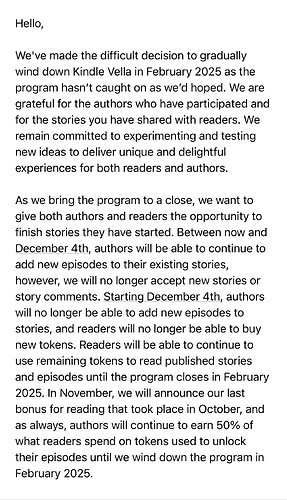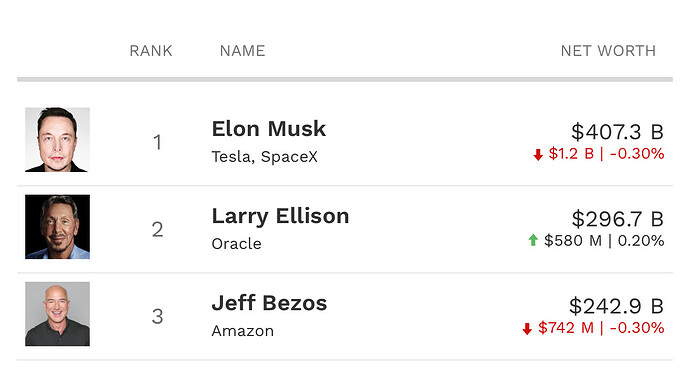I already knew Kindle Vella sucked and didn’t get enough readership, but I didn’t know it was this bad.
Bold theory: A lot of those Google- and Amazon projects fail because users kind of expect them to disappear rather sooner than later. So why bother to begin with?
Maybe throwing random half-baked ideas at the wall in hopes that something instantly sticks isn’t the most efficient way of innovating. The first wheel wasn’t perfectly round, either.
An expectation that both companies have spent years encouraging!
And the more investment the project requires from the user, the more wary they are going to be.
Honestly, yeah. I knew it was bad from the start. It was trying too hard to be a replacement for WebToons, but I believe Tapas has web novels as well, so they didn’t have much going for them. They were at a deficit instead. Not only that but getting to the site was not easy! I would be misdirected to the main Amazon page or the regular Kindle page. Vella was not visible on Kindle devices either and it was overall, very inconvenient. To be honest, it should have been its app if it was going to stand a chance, but instead, they lumped it in with the rest of Amazon. No marketing was done. No one knew about it. When I would tell the family about it, they’d go"Kindle what now?"
Well it didn’t require any money investment, but they made it seem like they would handle the marketing, but no one knew about Kindle Vella besides writers. That in itself is a huge issue. Readership, even for the most read stories, was shockingly low. It needed expanding. It was not capable of audio. It did not allow for the author to create banners and sample chapters strictly for advertising as WebToons does. It was lackluster and I found the offerings boring. Why? Because chapter by chapter does not work unless the whole thing has already been finished. You can’t write a chapter of an unplanned and unwritten book and release it, then just decide to fix it later. It’s already out. People already read it and now you’re stuck with your mistake. Sure, you can edit it, but what good will that do?
A writer’s time and effort are valuable, too. As are the opportunities that might be missed by not putting the work elsewhere.
Serialization can work, but writing something that’s intended to be serialized is different from writing a book that’s intended to read as a complete thing.
That’s a clear sign that Amazon was never really committed to it. Certainly if they want to drive traffic somewhere, they know how to do it.
I mean, yeah. You have a point. It does come down to the marketing though. Spiderman, for instance, is serialized. It is very clear that it is. Vella decided to market itself as a way for writers to make money on their book while they finish writing it and then they can publish the whole book via kdp when they are done. Which is not right, because it messes with the editing process. And if you had it done already, then why not just publish it already? It tried to solve a non-issue. Serialized is it’s own thing that started with magazines and radio. It should have been very clear in the marketing, what this was for. It paid depending on how many words you write, which is not how taditional publishing works. It encourages needless scenes, prose, and extra dialogue just to make up money for time spent. The whole thing was an ick.
Great idea, terrible implementation. (No international release, not available on Kindles, weird royalty and the bonususe were… odd.)
Yeah, I had no idea it existed until I saw this post… welp.
There are Vella-like alternatives.
When Amazon release a new offering and it’s restricted to the US and doesn’t include traditional ‘early adopter’ markets like Aus, their heart isn’t in it and it’s going to flop. ![]()
Excuse the language, but as we say in Aus (and probably elsewhere) it’s the old ‘throw shit at the wall and see what sticks’ marketing (also used in politics) strategy, never noted for a high success rate.
I’d argue[1] that the “two way door” model of trialling things rapidly and then shutting them off just as quickly if they don’t achieve expectations has worked very well for Amazon. Make reversible decisions quickly.
I suspect Jeff Bezos’ accountant would too ↩︎
hmm. Considering how many of them have been ‘quickly shut off’, I’d wonder how well it’s worked.
Their domination (~monopoly) in core market segments is responsible for that wealth, not their half-arsed attempts at things like Vella, mobile phones etc. Haven’t seen similar with Oracle, not that I follow them.
As for Musk - smart investing early (and elbowing original founders out) helped him immensely, along with $Billions in subsidies etc.
I agree. The additional piece of info, however, is that the things that became core for Amazon were the things they tried quickly and worked.
Amazon didn’t invent selling books. They didn’t instantly start selling other things all at once. Oh, and Amazon Web Services (which alone generates over half of Amazon’s earnings), Amazon Prime and Prime Video all famously started as little things to try quickly that Bezos has publicly stated would never have been implemented without this approach.
Again with Musk… there is a missing piece of his delivery strategy that contributes enormously to his success and that’s “fail fast”. Make mistakes; fix them.
Sometimes the best business case is a successful pilot, and sometimes a quick user pilot is significantly cheaper than hand wringing pre-launch. As long as you genuinely pull the plug quickly on underperforming projects, it can be a LOT cheaper than the lost revenue from never trying these things.

